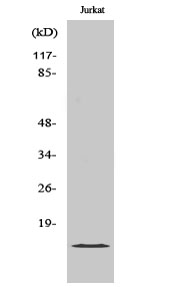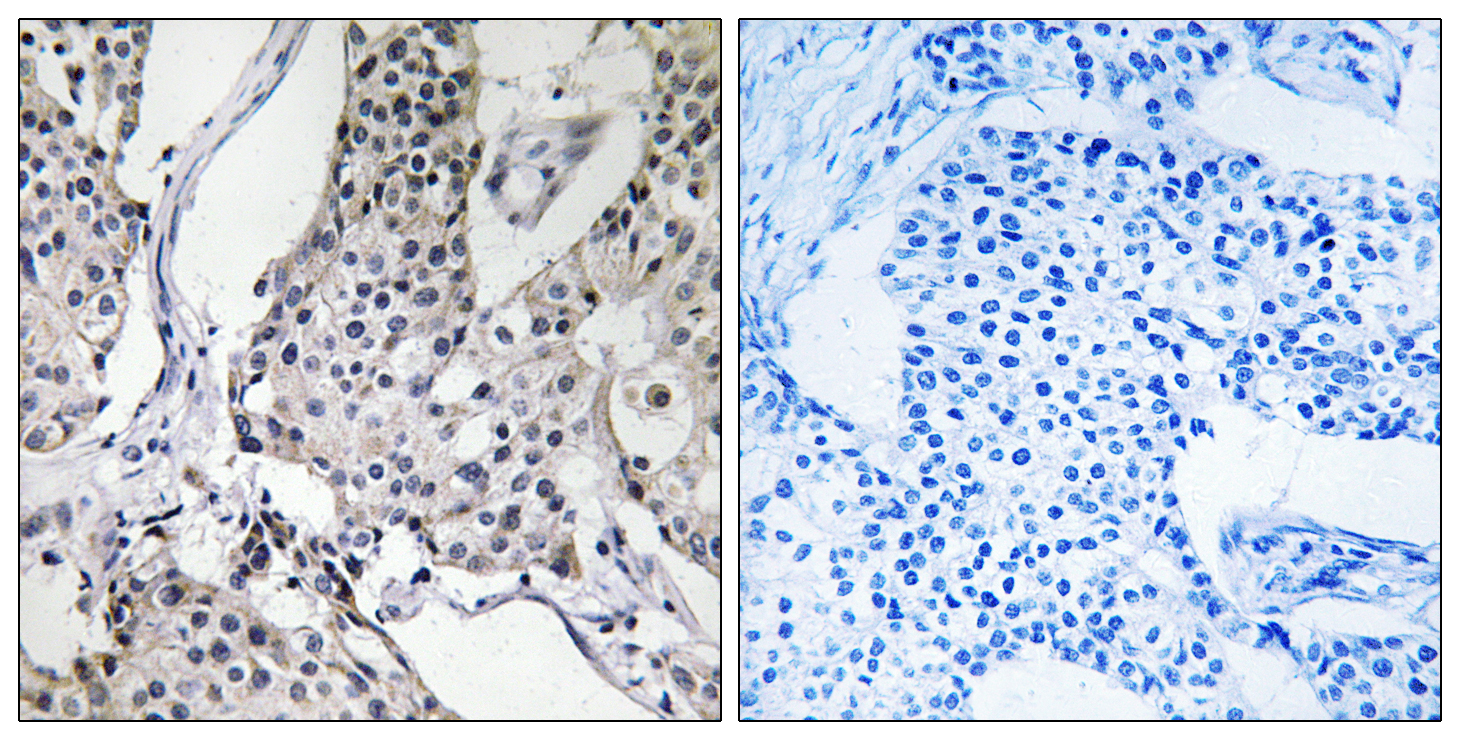PHLDA3 Polyclonal Antibody
- Catalog No.:YT3703
- Applications:WB;IHC;IF;ELISA
- Reactivity:Human;Mouse;Rat
- Target:
- PHLDA3
- Gene Name:
- PHLDA3
- Protein Name:
- Pleckstrin homology-like domain family A member 3
- Human Gene Id:
- 23612
- Human Swiss Prot No:
- Q9Y5J5
- Mouse Gene Id:
- 27280
- Mouse Swiss Prot No:
- Q9WV95
- Rat Gene Id:
- 363989
- Rat Swiss Prot No:
- Q5PQT7
- Immunogen:
- The antiserum was produced against synthesized peptide derived from human PHLDA3. AA range:21-70
- Specificity:
- PHLDA3 Polyclonal Antibody detects endogenous levels of PHLDA3 protein.
- Formulation:
- Liquid in PBS containing 50% glycerol, 0.5% BSA and 0.02% sodium azide.
- Source:
- Polyclonal, Rabbit,IgG
- Dilution:
- WB 1:500 - 1:2000. IHC 1:100 - 1:300. ELISA: 1:40000.. IF 1:50-200
- Purification:
- The antibody was affinity-purified from rabbit antiserum by affinity-chromatography using epitope-specific immunogen.
- Concentration:
- 1 mg/ml
- Storage Stability:
- -15°C to -25°C/1 year(Do not lower than -25°C)
- Other Name:
- PHLDA3;TIH1;Pleckstrin homology-like domain family A member 3;TDAG51/Ipl homolog 1
- Observed Band(KD):
- 15kD
- Background:
- domain:The PH domain binds phosphoinositides with a broad specificity. It competes with the PH domain of AKT1 and directly interferes with AKT1 binding to phosphatidylinositol 4,5-bisphosphate (PIP2) and phosphatidylinositol 3,4,5-triphosphate (PIP3), preventing AKT1 association to membrane lipids and subsequent activation of AKT1 signaling.,function:p53/TP53-regulated repressor of Akt/AKT1 signaling. Represses AKT1 by preventing AKT1-binding to membrane lipids, thereby inhibiting AKT1 translocation to the cellular membrane and activation. Contributes to p53/TP53-dependent apoptosis by repressing AKT1 activity. Its directs transcription regulation by p53/TP53 may explain how p53/TP53 can negatively regulate AKT1. May acts as a tumor suppressor.,induction:By p53/TP53; expression is directly activated by p53/TP53. p53/TP53 phosphorylation on 'Ser-15' is required to activate the PHLDA3 promoter.,miscellaneous:PHLDA3 genomic locus is frequently observed in primary lung cancers, suggesting a role in tumor suppression.,similarity:Belongs to the PHLDA3 family.,similarity:Contains 1 PH domain.,tissue specificity:Widely expressed with lowest expression in liver and spleen.,
- Function:
- domain:The PH domain binds phosphoinositides with a broad specificity. It competes with the PH domain of AKT1 and directly interferes with AKT1 binding to phosphatidylinositol 4,5-bisphosphate (PIP2) and phosphatidylinositol 3,4,5-triphosphate (PIP3), preventing AKT1 association to membrane lipids and subsequent activation of AKT1 signaling.,function:p53/TP53-regulated repressor of Akt/AKT1 signaling. Represses AKT1 by preventing AKT1-binding to membrane lipids, thereby inhibiting AKT1 translocation to the cellular membrane and activation. Contributes to p53/TP53-dependent apoptosis by repressing AKT1 activity. Its directs transcription regulation by p53/TP53 may explain how p53/TP53 can negatively regulate AKT1. May acts as a tumor suppressor.,induction:By p53/TP53; expression is directly activated by p53/TP53. p53/TP53 phosphorylation on 'Ser-15' is required to activate the PHLDA3 prom
- Subcellular Location:
- Cytoplasm . Membrane ; Peripheral membrane protein .
- Expression:
- Widely expressed with lowest expression in liver and spleen.
- June 19-2018
- WESTERN IMMUNOBLOTTING PROTOCOL
- June 19-2018
- IMMUNOHISTOCHEMISTRY-PARAFFIN PROTOCOL
- June 19-2018
- IMMUNOFLUORESCENCE PROTOCOL
- September 08-2020
- FLOW-CYTOMEYRT-PROTOCOL
- May 20-2022
- Cell-Based ELISA│解您多样本WB检测之困扰
- July 13-2018
- CELL-BASED-ELISA-PROTOCOL-FOR-ACETYL-PROTEIN
- July 13-2018
- CELL-BASED-ELISA-PROTOCOL-FOR-PHOSPHO-PROTEIN
- July 13-2018
- Antibody-FAQs
- Products Images

- Western Blot analysis of various cells using PHLDA3 Polyclonal Antibody

- Immunohistochemistry analysis of paraffin-embedded human breast carcinoma tissue, using PHLDA3 Antibody. The picture on the right is blocked with the synthesized peptide.



